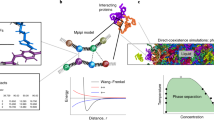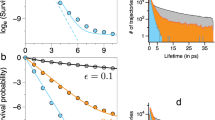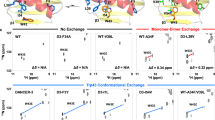Abstract
THEORETICAL profiles of the thermal denaturation of random sequence DNA that were calculated by Frank-Kamenetskii and Vologodskii1 displayed a number of narrow subtransitions. In several ways these subtransitions resembled the thermalities observed experimentally in derivative denaturation profiles2–7. Lyubchenko et al.8 extended their theoretical work to include the known sequence of ΦX174 DNA and claim that not only the shape of prominent subtransitions, but also the number and denaturation temperatures are essentially the same for both calculated and observed denaturation profiles. We suggest that the agreement between current theory and experiment is not as satisfactory as has been implied, and that at least one critical parameter has been neglected in the theory and ignored in the discussions of Lyubchenko et al.8.
This is a preview of subscription content, access via your institution
Access options
Subscribe to this journal
Receive 51 print issues and online access
$199.00 per year
only $3.90 per issue
Buy this article
- Purchase on Springer Link
- Instant access to full article PDF
Prices may be subject to local taxes which are calculated during checkout
Similar content being viewed by others
References
Frank-Kamenetskii, M. D. & Vologodskii, A. V. Nature 269, 729–730 (1977).
Vizard, D. L. & Ansevin, A. T. Biochemistry 15, 741–750 (1976).
Ansevin, A. T., Vizard, D. L., Brown, B. W. & McConathy, J. Biopolymers 15, 153–174 (1976).
Wada, A., Tachibana, H., Veno, S., Husimi, V. & Machida, Y. Nature 269, 352–353 (1977).
Gotoh, O., Husimi, Y., Yabuki, S. & Wada, A. Biopolymers 15, 655–670 (1976).
Wada, A., Tachibana, A., Gotoh, O. & Takanami, M. Nature 263, 439–440 (1976).
Lyubchenko, Y. L., Frank-Kamenetskii, M. D., Vologodskii, A. V., Lazurkin, Yu. S. & Gauze, G. C., Jr Biopolymers 15, 1019–1036 (1976).
Lyubchenko, Y. L., Vologodskii, A. V. & Frank-Kamenetskii, M. D. Nature 271, 28–31 (1978).
Sanger, F. et al. Nature 265, 687–695 (1977).
Fixman, M. & Freire, J. J. Biopolymers 16, 2693–2704 (1977).
Poland, D. Biopolymers 13, 1859–1871 (1974).
Gruenwedel, D. W. Biochim. biophys. Acta 340, 16–30 (1974).
Wartell, R. M. Biopolymers 16, 1115–1137 (1977).
Borer, P., Dengler, B. & Tinoco, I. J. molec. Biol. 86, 843–853 (1974).
Gray, H. B., Jr, Ostrander, D. A., Hodnett, J. L., Legerski, R. J. & Robberson, D. L. Nucleic Acids Res. 2, 1459–1492 (1975).
Author information
Authors and Affiliations
Rights and permissions
About this article
Cite this article
VIZARD, D., WHITE, R. & ANSEVIN, A. Comparison of theory to experiment for DNA thermal denaturation. Nature 275, 250–251 (1978). https://doi.org/10.1038/275250a0
Received:
Accepted:
Issue Date:
DOI: https://doi.org/10.1038/275250a0
This article is cited by
Comments
By submitting a comment you agree to abide by our Terms and Community Guidelines. If you find something abusive or that does not comply with our terms or guidelines please flag it as inappropriate.



